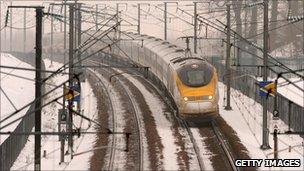'Snow supremo' needed to avert winter transport chaos
- Published
- comments
Heavy snow and ice have caused chaos across the UK
The UK should appoint a "snow supremo" to try to avoid another winter of chaos at airports, MPs have recommended.
The Transport Select Committee examined the impact of heavy snow last December which shut Heathrow, Gatwick and major train lines, and left roads impassable.
The committee said it wanted airports to be forced to plan more effectively so people had at least basic supplies.
It said a culture change was needed in the rail industry to ensure the welfare of passengers was taken seriously.
The committee said failure to provide information about rail services should cost those firms responsible money.
The MPs also called for a further £10m in funding to enable the Met Office to provide better long-term forecasts.
'Improve preparedness'
The Transport Committee of cross-party MPs has been examining the response to the severe weather of December 2010.
It suggested that Transport Secretary Philip Hammond should appoint a senior Department for Transport official who would oversee snow plans at Heathrow and other airports.
The committee's report, which pointed out that the winter was the third in a row with severe weather, said that better weather forecasting could help warn the country to be more prepared.
Mr Hammond said he agreed with the committee that some disruption during extreme weather was inevitable.
"We have already started work to improve our preparedness for the coming winter," he said.
He said the government had set up a committee to consider scientific and economic advice on severe weather preparations.
His department was also planning a revamp of the regulatory framework for airports, and was looking at ways to keep motorists informed of any problems on their network.
The committee said the current seasonal predictions from the Met Office "do not provide a firm basis on which decision-makers can act with confidence".
It also said that Mr Hammond had put the £10m price tag on the additional computing power needed by the Met Office to provide more accurate 10-year predictions.
The committee's chairman, Louise Ellman MP, said: "Given the huge cost of winter weather disruption to the economy - some £280m per day in transport disruption alone - the £10m suggested by Mr Hammond would be a small price to pay to improve the Met Office's long-range forecasting capability."
Findings rejected
In response the Met Office said: "We welcome the committee's findings and its acknowledgement of the quality of our short-range forecasts provided through November and December of last year.
"Throughout the cold weather, the Met Office provided consistently good advice. Of 13 individual spells of severe weather, the Met Office forecast provided very good advice on 12 of them," a spokesperson said.
The report singled out Heathrow, which was at a virtual standstill for days when the snow hit.
It said the airport was totally unprepared to recover from any major incident which necessitated its closure.
A BAA spokesman rejected the criticism.
"This is contrary to the findings of the (BAA-commissioned) inquiry by Professor David Begg, which found that BAA had historically 'demonstrated its ability to respond well to earlier weather events', and also contrary to the evidence from the airspace closure caused by volcanic ash in 2010."
The firm has already said it will invest £50m in snow defence equipment, and is putting in place better procedures for any future major disruptions.
'Anger and upset'
On the railways, the committee proposed financial incentives for companies to keep passengers better informed.
It also said the resilience of the third rail network south of the Thames should be improved, and the long-term aim should be to replace the existing network with a more resilient form of electrification.

Eurostar was one of the many transport services that witnessed major disruption last December
Anthony Smith, chief executive of rail customer watchdog Passenger Focus said: "Passengers will be pleased to see this report acknowledges many of the information failings that happened during the snow disruption in December.
"Failing to provide information at times of disruption is the number one cause of anger and upset on the part of passengers."
He added that some train companies had continued to sell tickets for trains they knew were unable to run.
The Association of Train Operating Companies (Atoc) recognised that the industry needed to improve.
"We will examine this report closely and continue to work with the rest of the industry to make sure passengers get the services that they expect and deserve."
The committee's other recommendations include:
Airport operators should be allowed to reclaim the cost of looking after stranded passengers from airlines that have failed to do so
Better online advice on how individuals and communities can tackle problems arising from severe winter weather
A high profile campaign to encourage more motorists to take precautions for driving in winter weather
Mrs Ellman of the Transport Select Committee said: "Every airport operator must now be pushed to plan properly for bad weather, so that people are not left stranded and without even basic supplies in airport terminals for days on end."
- Published14 March 2011
- Published8 March 2011
- Published21 December 2010